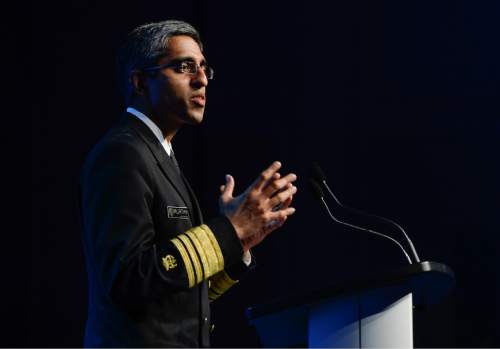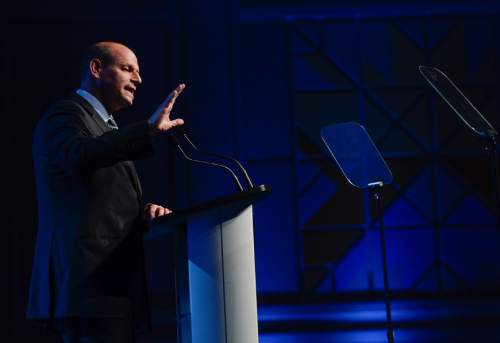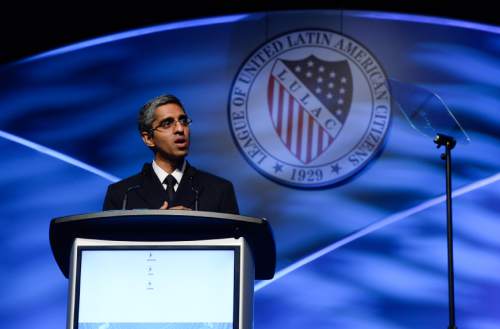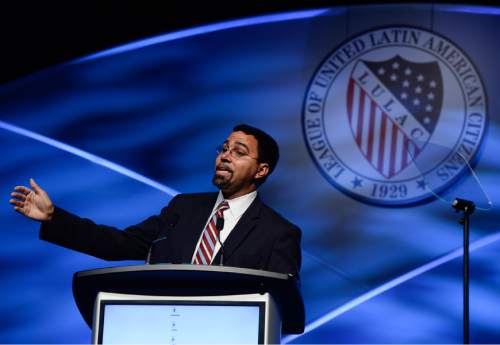This is an archived article that was published on sltrib.com in 2015, and information in the article may be outdated. It is provided only for personal research purposes and may not be reprinted.
Leon Rodriguez, the nation's top immigration and naturalization official, used a Salt Lake City speech Wednesday to outline a new, expanded drive to boost the political power of Latinos — by helping more of them to become U.S. citizens.
"There are 9 million people as we stand here today who are legal permanent residents who are eligible to become U.S. citizens right now," Rodriguez told the national convention of the League of United Latin American Citizens in the Salt Palace. "A quarter of those individuals are of Mexican heritage."
Rodriguez, director of U.S. Citizenship and Immigration Services (USCIS), said many legal immigrants who have been in the country for 10 years or longer simply fear to apply for citizenship.
"Sometimes it is the fear of the process itself, fear of the test, fear of the language requirement, fears that can easily be overcome if we show people the way," he said.
Others do not see why it is important to be a citizen. He said his own grandmother was one of them — and lived in America for 30 years before becoming a citizen. "We had to make the case to her why naturalization mattered."
That included explaining that non-citizens cannot vote, run for office or serve on juries — which hurts their power for change. "There are some jobs they cannot hold," he added. "There are opportunities to bring relatives from abroad that are not available if you are not a U.S. citizen."
So USCIS is launching expanded ads, public-service announcements and new promotional materials in English, Spanish, Chinese and Vietnamese — and partnering with local groups to distribute them and help immigrants through the naturalization process.
"If we are to encourage people to naturalize, if we are to encourage them to integrate, then we need to find them where they are. We need to communicate with them in their language, through the media they use," he said.
Beginning in September, the agency will, for the first time, begin offering credit-card processing for naturalization fees, he said. "To the extent that money has been an obstacle for some, this will start to clear that up" by allowing payments over time through credit-card companies.
Rodriguez said the administration is taking other steps to help immigrants, including President Barack Obama's recent executive orders seeking to allow more undocumented immigrants to stay in the country. Those orders have been blocked while courts review whether they are legal.
But Rodriguez, speaking for a minute in Spanish, urged undocumented immigrants, "Don't lose hope because I have confidence … that not only will we help you with deferred action, but we are going to arrive at a point where you will see an immigration law that will give us the path where you will be able to participate 100 percent in our society" as citizens.
He added, in English, about undocumented immigrants, "Anyone who is telling the truth knows that these individuals are here to stay. That is a fact. Most of them are not going anywhere."
So Rodriguez said that "the long-term goal is not just to defer [deportation] action … but ultimately to have comprehensive immigration reform that gives these individuals the opportunity to get right with the law and make a future for themselves."
Two other officials also told the Latino civil-rights group that the Obama administration is a friend trying to help improve Latino health and education.
U.S. Surgeon General Vivek H. Murthy said, "We have been able to expand health care coverage to 4.2 million Latinos in the last two years through the Affordable Care Act. That's a drop in the uninsured data of over 12 percent."
He also said America should treat health care "as the civil rights issue that we know it is," and ensure that preventative and other care "are available to all people in America, not just the privileged."
John King, a senior adviser to U.S. Education Secretary Arne Duncan, said the administration is pushing to ensure that reauthorization of the Elementary and Secondary Education Act will help Latinos — including proposing $1 billion in additional Title 1 funding for needy schools.
"There are voices that are advocating for a change in the Title 1 formula that would actually move funds from the highest-needs schools to more affluent schools, Robin Hood in reverse," he complained.
"There is a critical role for the federal government to protect the civil rights of citizens [in education]," he said. "We must have reauthorization of the law that ensures that states and districts are focused on the performance of all their students, and that we are working to close achievement gaps."











